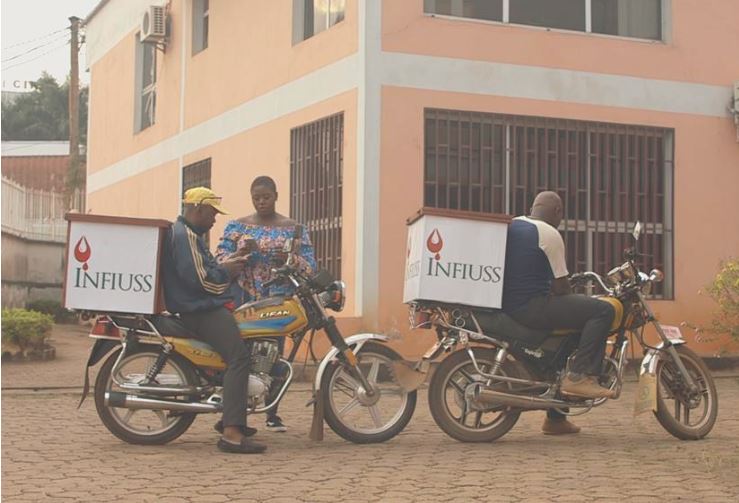Cartier has announced Cameroon based entrepreneur, Melissa Bime, as the 2018 Cartier Women’s Initiative Awards Sub-Saharan African laureate. Melissa received her award at the programme’s annual ceremony, held in Singapore.
What is Cartier Women’s Initiative Awards?
The Cartier Women’s Initiative Awards, created in 2006, are a joint partnership project initiated by Cartier, the Women’s Forum, McKinsey & Company and INSEAD business school to encourage women entrepreneurs.
Six Laureates, one from each continent (Asia & Pacific, Europe, Latin America, Middle East and North Africa, North America, Sub-saharan Africa) are honored annually for the creativity, financial sustainability and social impact of their start-up businesses.
The prize includes a place on an INSEAD Executive Programme, a US$100,000 Grant (money), international media exposure and networking and coaching opportunities
—————————————————————————————————-
Her company, INFIUSS Social Ventures, is a digital platform which gives hospitals access to readily usable blood reserves by efficiently checking blood availability in the local area and organizing its pick up and delivery by motorcycle. The young entrepreneur has been battling with people’s beliefs that their donations will be used for blood magic and with her own family’s opposition to her entrepreneurial career, but neither of these factors deterred her resolve to bring a positive change to her country’s social issue.
Cartier CEO Cyrille Vigneron announced the six laureates selected by an independent international jury amongst nearly 2,800 applications from over 130 countries.
Each laureate has been awarded US$100,000 in prize money. All laureates and finalists will be receiving personalized business coaching, media visibility, networking opportunities as well as the option to attend an INSEAD Executive Program (ISEP).
At the tender age of 21, Melissa Bime is already making a mark on the world.
Following her Nursing degree in Cameroon, Melissa was expected to go back home to help her mother with the housework – but Melissa had other ideas. Whilst working in the hospital, she was taken aback by the tragedies witnessed as a result of avoidable conditions, often due to the simple lack of available compatible blood. A five-year-old girl called Rita pulled on Melissa’s heartstrings when she passed away from anemia caused by malaria when no blood was available. Only a few days after her death, the hospital found out that the compatible blood was, in fact, available from a nearby medical facility. “Seeing a little girl died because the hospital could not source blood from a nearby facility angered me. I could not keep working as a nurse- I did not want to be part of a system where I had to simply watch these cases,” says Melissa.
Putting her medical knowledge to one side, Melissa took it upon herself to find a solution to the inaccessibility of local blood supplies, experienced by hospitals and doctors in Yaoundé. In 2015, aged just 18, Melissa founded Infiuss, a digital supply-chain platform that gives hospitals access to ready-to-use blood.
According to the World Health Organization, blood shortages and blood-related complications in the Sub-Saharan region claim 570,000 lives every year. With hospitals relying solely on their own blood reserves or blood donations from relatives of patients (using only the most basic of screening tests), the high number of deaths in the region is understandable yet preventable.
Infiuss operates as a “blood bank” collecting and categorizing blood supplies, but also as a database of all the blood types available at various hospitals. In an emergency, a hospital will call or send a text message to Infiuss, which will efficiently check where the required blood is available via the digitalized platform, organize the collection of blood supplies and coordinate delivery by motorcycle. Thus far, Infiuss has transported over 230 litres of blood via 6 hospitals. This number is expected to rise substantially as the partnership expands to 908 hospitals across Cameroon in the near future.
Running a medical business in Cameroon, Melissa has faced all sorts of challenges. Besides her family’s lack of initial support and the levels of bureaucracy involved, Infiuss had to navigate cultural stereotypes too. “In Cameroon, blood is often seen as a taboo. We’ve had to spend a lot of time convincing potential donors that the blood they donate won’t be used to do ‘magic’ as some belief but to save lives”. There have also been unexpected challenges, such as the shutting down of internet services by the government to stifle online activists during periods of protesting, which means that users cannot access Infiuss’ database. “If the suspension of internet services hasn’t killed my business nothing can stop me,” comments Melissa, who has throughout her journey remained defiant, not allowing her lack of business experience or young age to slow her down.
What’s her motivation? Put simply, it’s hunger: “I am hungry to create change and make a difference. I have overcome so much but know that it is all worthwhile.”

SOURCES: Cartier Women’s Innitiative, Cartier, wikipedia